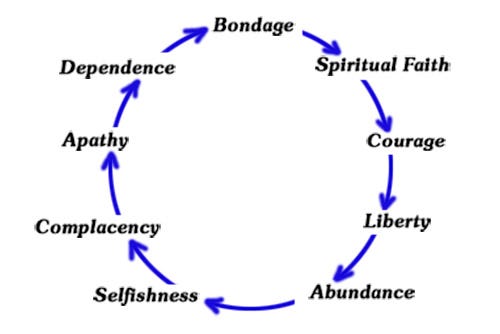American artist Thomas Cole painted a series of five paintings, between 1834 to 1836, depicting the rise and fall of a mythical empire. Heavily influenced by the classical republics/democracies of Greece and Rome, the series, entitled The Course of Empire, traced the evolution of a landmass as it is settled by humans and, from growth to decay, abandoned to allow reclamation by nature. These famous paintings are used as illustrations (extremely convenient as they are in public domain) to set the tone for any subsequent essay. Destruction is a perfect example of the fall of Rome and used by me and even Victor Davis Hanson as an allegorical depiction of the rise and eventual fall of the Great American Empire.
The Consummation of Empire (above) represents the pinnacle of this mythical civilization; it is the Golden Age, that Shinning City on the Hill as heralded by Ronald Reagan. It’s a city within which I would very much want to reside. It’s vibrant and beautiful and the people all appear to be happy and fulfilled. It is the aspiration of the utopian promise made by every democrat and dictator alike.
It could be pondered whether Cole had been influenced by Alexander Fraser Tytler, Lord Woodhouselee. A professor of Universal History and of Greek and Roman Antiquities at the University of Edinburgh, Tytler had studied the democratic and republican forms of governments through antiquity and believed there was really nothing of importance in these forms of government, as none had lasted beyond two hundred and fifty years. In the 1790s, he identified the phases in which these governments lived and died: “From bondage to spiritual faith; from spiritual faith to great courage; from courage to liberty; from liberty to abundance; from abundance to selfishness; from selfishness to complacency; from complacency to apathy; from apathy to dependence; from dependence back into bondage.”
During the Obama years there was a general malaise that began sweeping our land, preceded by years of war and the 2008 financial crash. Mitt Romney pointed out that forty-nine percent of the citizenry depended upon the federal government for assistance. Dependence is the last step to bondage but he was roundly criticized for this observation and it was one reason Obama beat him in 2012. There was that brief respite with Donald Trump’s first administration but like a flu that refuses to go away, Biden brought it back with a vengeance.
The purging of conservative officers in the armed forces by Obama led the way to a woke military answerable only to progressive masters. His use of the IRS to target conservatives was tyrannical. The behind the scenes spying on conservatives and even U.S. senators was a giant first step toward despotism. Biden’s covid lockdowns, forced vaccinations, and fascist censorship through the partnership of government and private enterprise was close to delivering us into bondage.
Which now leads to Trump’s presumptive second term.
Donald Trump promised a new golden age in America and the promises are remarkable and thorough. His call for renewals of domestic and foreign policies are lofty and if but a fraction can ultimately be fulfilled, will still provide a starting point, a touchstone, for where subsequent generations need travel.
The dismantling of the administrative state is paramount for if that is not accomplished, no other reform will take hold; once a populist no longer governs, the old guard will simply rebuild and, with Biden’s example, the rebuild will be swift and destructive.
The disarmament of the military-industrial complex, or more succinctly the Security State, will destroy the need for constant war that was required to preserve an empire that is anathema to our founding principles. It will also purge the use, by unscrupulous tyrants, of the intelligence agencies that obstruct the exercise of our free will.
The elimination of corruption within our federal justice system will eradicate the temptation of future presidents to prosecute political enemies and use the apparatus and trappings of the Security State to subvert the will of the people, too often utilized to consolidate despotic powers.
The shredding of the regulatory state will remove the oft used fascist relationship between the state and corporate behemoths, monopolistic in key markets such as agriculture, health care, pharmaceuticals, technology, and finance. Most regulations have been established at the behest of the fascist blob in order to establish these monopolies, sucking capital away from start-ups and entrepreneurs, destroying competition at its most basic level. These arrangements are also the perfect vehicles for the powerful to raid public monies.
An overhaul of our tax system could unleash a prosperity in this nation that has not been seen in decades, with the exception of the first Trump Administration. Tariffs have been labeled as the boogeyman, as it was cited as one of, if not the major cause of the Great Depression. History has shown this to be untrue. As Trump has highlighted, prior to the 16th Amendment, the government was funded mostly by tariffs. Most do not realize that in the passing of the 16th Amendment only the top one percent were to be taxed. Once we entered into free trade, the only way to fund the government became the expansion of the income tax into the moral rot that it has become. The only concern with moving funding away from the income tax is that as long as the 16th Amendment is within the Constitution, it will always be the Sword of Damocles hanging above our heads.
One of the greatest of all reforms would be the end of education being dictated from Washington and the unleashing of entrepreneurialism through school choice. The escape from poverty can only be accomplished through a rigorous education of those who are enslaved in poverty plantations. True equality and freedom is accomplished through the enlightenment of the citizens.
The Founders’ goal was for a government that touched the people in a very limited fashion. The progressive movement to make government all things to all people outsourced people’s charity to the government and ensured that the wealthy remain wealthy and the poor remain poor.
The ebbs and flows of our natural world, that constant bell curve of existence, cares nothing of well-meanings; it is neutral and the final arbiter of life and death. Growth leads to decline; decline leads to growth. Somehow, we may have skipped Tytler’s bondage—though narrowly and briefly—and, as Vivek Ramaswamy said, have returned to a 1776 moment that gives birth to a revolution of renewal. At this juncture, as the nation limps into our 250th birthday in 2026, spiritual faith and courage is in demand in order to extend our democratic republic beyond its shelf life.





